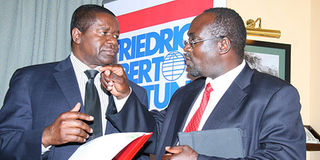Breaking News: At least 10 feared to have drowned in Makueni river
IEBC invites parties to inspect results tool

Independent Electoral and Boundaries Commission (IEBC) CEO James Oswago (left) confers with CEO Africa Policy Institute (API) Peter Kagwanja (right) during an election forum at the Stanley Hotel, Nairobi January 16, 2013. The IEBC has invited political parties to inspect the system it will use to transmit real time elections results on March 4. JENNIFER MUIRURI
The Independent Electoral and Boundaries Commission (IEBC) has invited political parties to inspect the system it will use to transmit real time elections results on March 4.
At the same time, hard copy results from areas that are more than three hours’ drive from Nairobi will be delivered by air.
IEBC on Wednesday said inspection of the technology by political parties will boost credibility of the results.
The International Foundation for Electoral Systems is working with the IEBC to develop a system that will enable transmission of the General Election results.
“We have asked the political parties to bring in their best information and technology experts to test our systems,” IEBC chief executive officer James Oswago said.
“We want to present the system to them and show how it will work, let them test it so that they can have faith in the technology as well,” he said.
This is the first time General Election results will be announced electronically.
Append signatures
But the electronic results will only be provisional, with the final results to be announced later after agents of each party have appended their signatures in the hard copy, commonly referred to as Form 16.
The results will be transmitted at three levels – constituency, county and at the national tallying centre – where similar figures will be consistently relayed at all tiers.
Mr Oswago told a forum discussing the preparedness of the IEBC to manage the General Election that there will be no room for errors.
“This is because the results received at the national tallying centre that will be based in Nairobi will have been verified at the constituency and the county tallying centres respectively across the country,” he said.
Presidential results will be announced first.
“By the close of the day on March 4, the country will get a picture of where different parties stand at the elections and their accumulated results,” he said.
“The system has repeatedly, consistently and demonstrably worked in all times we have carried tests to establish whether it can transmit the General Election results.”
The forum was organised by Freidrich Ebert Stiftung, Africa Policy Institute (API) and Electoral Institute for Sustainable Democracy in Africa (Eisa) at the Stanley Hotel in Nairobi.
Mr Oswago said that mainstream media in Kenya will be granted “unimpeded access” to the results as they will be transmitted directly from the polling centres across the country.
“There will be no room for anyone to doctor the results as the live feed will be seen by all across the tallying centres,” he said.
Accurate system
In cases where electronic results were transmitted during the recent by-elections, there was no variance from the hard copy results indicating the accuracy of the system, he said.
The commission CEO said the use of biometric voter registration kits during the developing of the voter register, and also the biometric voter verification kits at the polling stations will ensure that cases of fraud or impersonation are detected.
During the bungled 2007 General Elections there were 1.2 million “dead” voters as the defunct Electoral Commission of Kenya (ECK) relied on manual voter registers.
There were also allegations of stuffing ballot boxes; factors that made the Kriegler commission investigating the outcome conclude it was difficult to establish the winner of the elections.
The failure of the ECK to deliver a credible election in the 2007 badly stained the election management system and contributed to 2007/2008 post-election crisis.
“A lot can go wrong during the tabulation and transmission of the results and that is why we have relied heavily on technology,” Mr Oswago stated.
The forum, dubbed Kenya 2013 Elections Watch, said it will hold regular meeting with officials of the IEBC in the run up to the March 4 General Election to get assurance on the state of election management.
So far, the IEBC has successfully managed the 2010 referendum, several by-elections and introduced the biometric voter registration that has so far netted 14.4 million Kenyans who will be participating in the elections proper.
However, the commission has had challenges in the delays in procuring service and equipment and budget constraints.
It is yet to embark on voter education where Kenyans will for the first time be voting for six offices for the first time.
But organisers of the forum Prof Peter Kagwanja (API) and Eisa’s Felix Odhiambo expressed optimism that the commission will deliver during the General Election.




